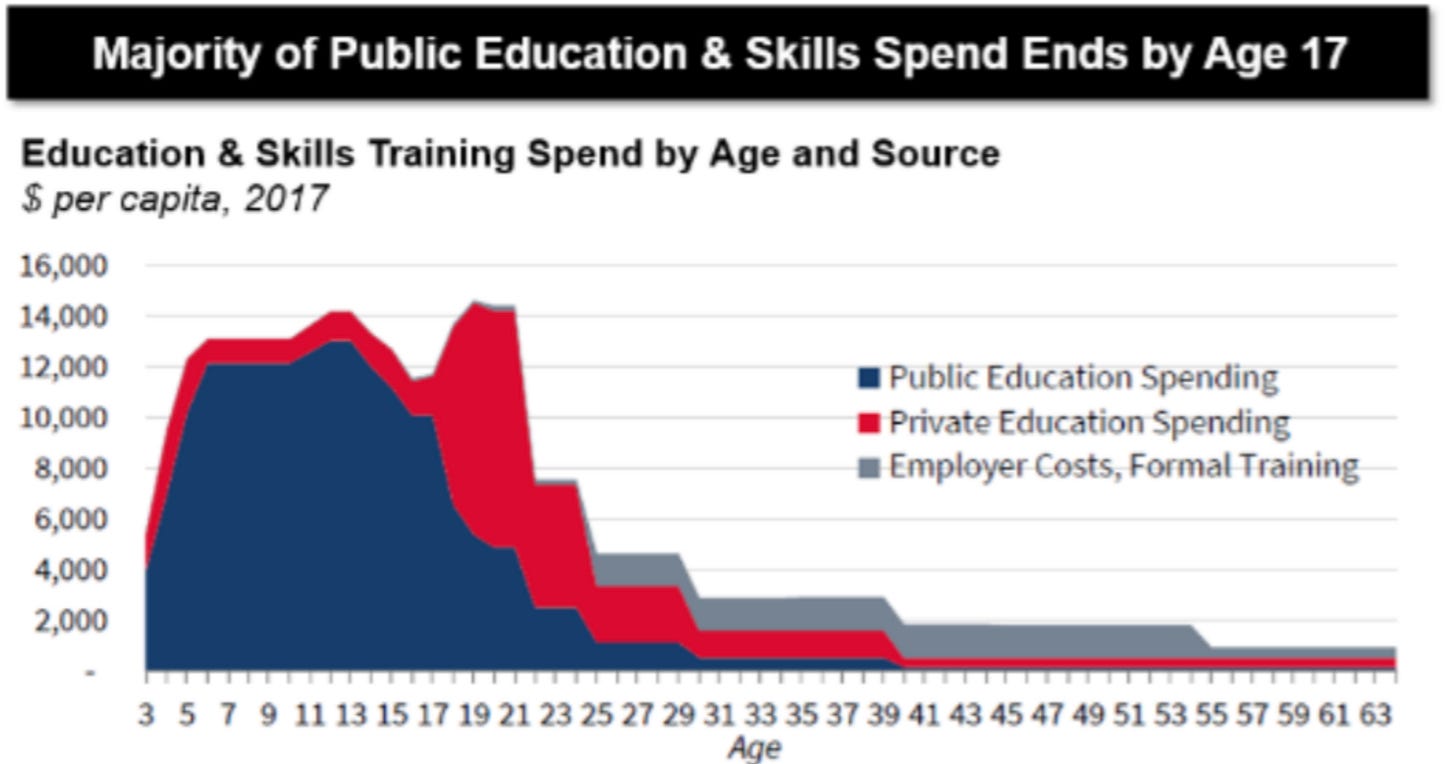Online Education and the Reskilling Boom

I have been spending more and more time on Youtube, Skillshare, and other online platforms.
A lot of what I’m doing there is learning. If you do it right, you can train the algorithm to work for you, rather than pull you away into distraction.
I've also taken 2-3 online courses in the last year...one cohort style, then a few just as videos on my own time.
We're in the early phase of an online education boom.
If we look at how people currently spend their educational lives, we can see that almost all of it is stacked from ages ~5-25 both in time spent and by $ amount.

The questions is...what happens if this chart goes from people only learning from ages 5-25, and instead all the way to 55+?
I'm not saying it will be as drastic as the left side of this chart, but I can imagine a world where we see the right side (ages 25 and on) drastically increase.
Why?
Because we're entering an era where we will be "perpetual newbies, all of the time" as Kevin Kelly says.
Because of this, I think there will be a few skillsets/mindsets that help prepare you for this change to how our careers function.
1) Learning to Teach
Teaching involves course planning, structured learning, and assignment selection. Teaching is about helping someone build the next right micro-skill in a course of lessons that build on each other sequentially.
"Who gets to be a teacher in the future?"
Just as many more people today are writers or video creators, it might be way more people that you'd think.
2) Learning to Coach
Coaching involves more strategy work with individual clients or small teams. Coaches focus on performance improvement for someone else.
Tiger Woods had many coaches, but not because they were better at golf than him.
Coaching is a skillset, and one that can be learned. We might see coaches for every concievable career or domain.
3) Developing Your Presence on Video
As video grows in its total share of time we spend online, learning how to package and edit compelling content via video gets more important.
Video performance is likely the key skill for online educators. There are many aspects of putting together a video presentation that can only be learned from being on camera.
4) Re-Packaging at every Level of Depth
Learning to teach today means learning how to condense something into a Tweet or TikTok, as well as a Medium Post, as well as a 1-Hour Podcast.
Can you Tweet, Tiktok, Blog, and Record? Of course, you might have strength in longform or short form, but think of these "Mediums as the Message" and a language you want to learn how to speak.
5) Self-Education and Personalized Learning
Because of this shift to continuous learning, understanding how you specifically learn best becomes more important. It takes time to learn the methods that work for you to accelerate learning.
While you would have thought you developed this skill in highschool or post, the reality is these were one-sized-fits-all programs.
It might be that you find a new type of variety, technology, transcription, etc. leads to better support for your learning style.
...
In the distant future, we might find ourselves with AI teachers, full personalization and new types of digital colleges.
Until then, I'm personally preparing and adapting in a few ways:
- I hire coaches consistnetly every year to upskill and learn from, directly
- I have a weekly Youtube channel that's a new outlet for teaching, and is teaching me to utilize video.
- My coaching work is consistent coaching practice, with hours of conversations with Entrepeneurs and Founders every week.
- I have been working to develop, start, or hang out in professional communities such as Jacuzzi Club, a community for Brand owners and operators.
If the above thesis proves true, and we shift the amount of time, as part of our careers, we spend upskilling, I believe these skillsets will be massively useful in a continous learning age.
It's as good of a time as any to get started...
Creative Caffeine Newsletter
Join the newsletter to receive the latest updates in your inbox.